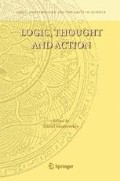Abstract
Many natural intensional properties in artificial and natural languages are hard to compute. We show that randomized algorithms are often necessary to have good estimators of natural properties and to verify some specific relations. We concentrate on the reliability of queries to show the advantage of randomized algorithms in uncertain cognitive worlds.
Access this chapter
Tax calculation will be finalised at checkout
Purchases are for personal use only
Preview
Unable to display preview. Download preview PDF.
References
Babai L. (1985). Trading Group Theory for Randomness. Symposium on the Theory of Computing, 421–429.
Burago D. and de Rougemont M. (1998). “On the Average Complexity of Graph Reliability”. Fundamenta Informaticae 36(4):307–315.
Burago D., de Rougemont M. and Slissenko A (1996). “On the Complexity of Partially Observed Markov Decision Processes”. Theoretical Computer Science, (157):161–183.
Couveignes J.M., Diaz-Frias J.F., de Rougemont M. and Santha M (1994). “On the Interactive Complexity of Graph Reliability”. FSTCS International Symposium on Theoretical Computer Science, Madras, LNCS 880:1–14.
de Rougemont M. (1995). The Reliability of Queries. ACM Principles on Databases Systems, 286–191.
de Rougemont M. and Schlieder C. (1997). Spatial Navigation with Uncertain Deviations. American Association for Artificial Intelligence.
Goldwasser S., Micali S. and Rackoff C. (1985). The Knowledge Complexity of Interactive Poof Systems. Symposium on the Theory of Computing, 291–304.
Lassaigne R. & de Rougemont M. (1996). Logique et complexité. Hermès.
Levin L. (1973). “Universal Sorting Problems”. Problems of Information Transmission 9(3):265–266.
Papadimitriou C. (1985). “Games Against Nature”. Journal of Computer and System Sciences 31:288–301.
Papadimitriou C. (1994). Computational Complexity. Addison-Wesley.
Sinclair A. (1993). Algorithms for Random Generation and Counting. Birhauser Verlag.
Valiant L. (1979). “The Complexity of Enumeration and Reliability Problems”. SIAM Journal of Computing 8(3).
Author information
Authors and Affiliations
Editor information
Editors and Affiliations
Rights and permissions
Copyright information
© 2005 Springer
About this chapter
Cite this chapter
de Rougemont, M. (2005). Logic, Randomness and Cognition. In: Vanderveken, D. (eds) Logic, Thought and Action. Logic, Epistemology, and the Unity of Science, vol 2. Springer, Dordrecht. https://doi.org/10.1007/1-4020-3167-X_22
Download citation
DOI: https://doi.org/10.1007/1-4020-3167-X_22
Publisher Name: Springer, Dordrecht
Print ISBN: 978-1-4020-2616-4
Online ISBN: 978-1-4020-3167-0
eBook Packages: Humanities, Social Sciences and LawSocial Sciences (R0)

